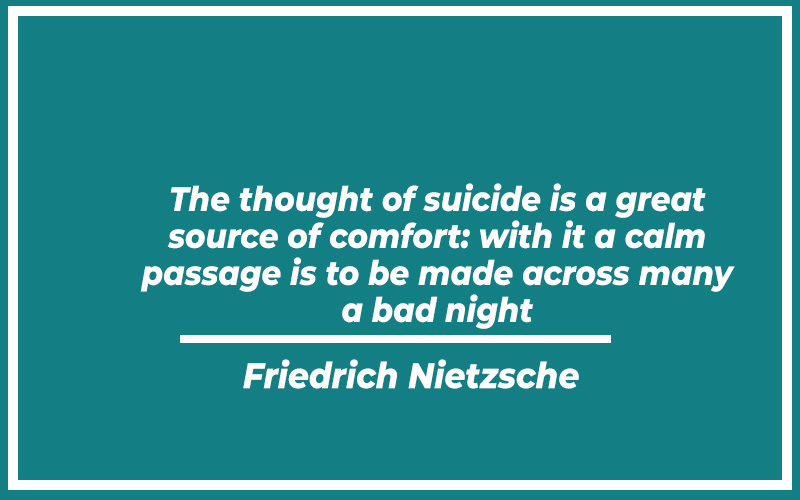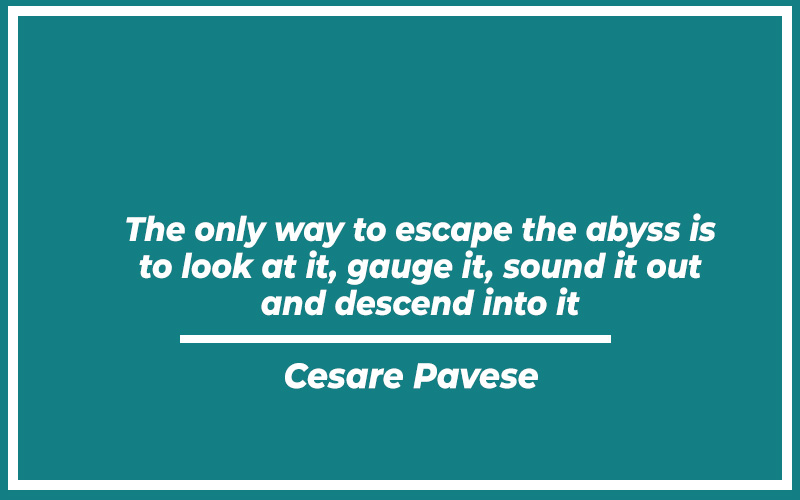Suicide quotes can be deeply moving and thought-provokingThey show the intense feelings and struggles of people who feel life’s challenges are too much.
You often see these quotes shared to raise awareness about mental health, to comfort those in pain, and to encourage empathy and understanding.
While some quotes express deep darkness and despair, others highlight hope, resilience, and the importance of seeking help.
Suicide Quotes

“The thought of suicide is a great source of comfort: with it a calm passage is to be made across many a bad night.”– Friedrich Nietzsche
Nietzsche’s quote reflects the paradoxical relief that the thought of suicide can provide. It suggests that merely considering the option can offer solace in distressing times, giving one the strength to endure.
The contemplation of an escape route can paradoxically make the present suffering more bearable, acting as a mental crutch through dark moments. This doesn’t advocate for the act itself but highlights the complex coping mechanisms the human mind employs when faced with profound despair.
Also Read: Steve Harrington Quotes (with Explanations)
“Suicide is man’s way of telling God, ‘You can’t fire me – I quit.'”– Bill Maher
Bill Maher‘s quote underscores the defiance inherent in the act of suicide. It presents the act as a final assertion of control, a refusal to endure suffering any longer. This perspective resonates with those who feel trapped in their circumstances, as it frames suicide as a bold, albeit tragic, declaration of autonomy.
It’s a stark reminder of the intense feelings of powerlessness and frustration that often accompany suicidal thoughts, and the lengths to which people might go to reclaim a sense of agency.
“The pain of depression is quite unimaginable to those who have not suffered it, and it kills in many instances because its anguish can no longer be borne.”– William Styron
Styron captures the profound isolation and intensity of depression. His quote conveys that the agony of depression is often incomprehensible to those who haven’t experienced it, emphasizing the lethal nature of this mental anguish.
It highlights the critical need for empathy and understanding, as the unseen torment can lead individuals to seek an end to their suffering through suicide. This quote advocates for greater awareness and compassion towards those battling such severe internal battles.
“If I had no sense of humor I should long ago have committed suicide.”– Mahatma Gandhi
Gandhi’s reflection speaks to the life-saving power of humor. It suggests that even in the darkest times, the ability to find humor can act as a vital coping mechanism. Humor provides a break from the relentless weight of depression, offering moments of relief and perspective.
This quote serves as a reminder of the importance of maintaining small joys and finding lightness even amid profound darkness, underscoring how crucial such moments can be in sustaining life.
“Nothing in my life has ever made me want to commit suicide more than people’s reaction to my trying to commit suicide.”– Emilie Autumn
Emilie Autumn’s quote highlights the stigma and misunderstanding often faced by those who attempt suicide. It reflects the additional pain inflicted by negative reactions and lack of empathy, which can exacerbate feelings of isolation and hopelessness.
This underscores the need for compassionate responses and support systems that validate and assist those in crisis, rather than compounding their struggles through judgment and alienation.
“I am constantly torn between killing myself and killing everyone around me.”– David Levithan
Levithan’s stark admission reveals the extreme turmoil experienced by individuals in severe psychological distress. It speaks to the intense internal conflict and anger that can accompany suicidal thoughts.
This raw expression underscores the importance of addressing mental health issues comprehensively, providing outlets for these intense emotions that do not lead to harm for oneself or others. It’s a call for understanding the depth of inner conflict that suicidal individuals often endure.
“Which of my feelings are real? Which of the me’s is me? The wild, impulsive, chaotic, energetic, and crazy one? Or the shy, withdrawn, desperate, suicidal, doomed, and tired one? Probably a bit of both, hopefully much that is neither.”– Kay Redfield Jamison
Jamison’s quote delves into the fragmented self-perception of someone dealing with bipolar disorder or severe depression. It reflects the confusion and identity crisis that can arise from fluctuating moods and states of being.
This insight calls for a nuanced understanding of mental health, recognizing that individuals are complex and multifaceted, and that their darker moments do not define their entire identity. It promotes a compassionate view of the struggles with self-identity in the face of mental illness.
“I am constantly torn between killing myself and killing everyone around me.”– David Levithan
Levithan’s stark admission reveals the extreme turmoil experienced by individuals in severe psychological distress. It speaks to the intense internal conflict and anger that can accompany suicidal thoughts.
This raw expression underscores the importance of addressing mental health issues comprehensively, providing outlets for these intense emotions that do not lead to harm for oneself or others. It’s a call for understanding the depth of inner conflict that suicidal individuals often endure.
“Death is nature’s way of telling you to slow down.”– Dick Sharples
Sharples’ quote offers a darkly humorous take on the inevitability of death. It suggests that life’s relentless pace can lead one to the brink of collapse, and in the darkest moments, death might seem like a natural conclusion.
This perspective underscores the importance of recognizing and addressing burnout and overwhelming stress before they lead to more severe consequences. It’s a reminder that life’s pressures should not be ignored and that seeking help is a crucial step in managing mental health.
“To run away from trouble is a form of cowardice and, while it is true that the suicide braves death, he does it not for some noble object but to escape some ill.”– Aristotle
Aristotle’s philosophical take on suicide frames it as an act of fleeing from life’s difficulties rather than confronting them. He posits that while it requires bravery to face death, the underlying motive is to evade suffering rather than achieving a higher purpose.
This quote invites contemplation on the nature of courage and the complexities of human motivation, emphasizing the need to find constructive ways to face and overcome life’s challenges rather than resorting to self-destruction.
“There is but one truly serious philosophical problem, and that is suicide.”– Albert Camus
Camus identifies suicide as the fundamental philosophical question, as it confronts the meaning of life itself. This quote underscores the existential crisis that can lead one to contemplate ending their life, challenging the individual to find purpose and value in existence despite its inherent absurdity.
Camus’ perspective emphasizes the need for deeper reflection on life’s meaning, urging individuals to seek out reasons to continue living, even amidst profound despair.
“No one ever lacks a good reason for suicide.”– Cesare Pavese
Pavese’s quote reflects a grim understanding that those who contemplate suicide often have compelling reasons driving their decision. It acknowledges the deep, personal pain and complex circumstances that lead to such thoughts.
This perspective underscores the importance of empathy and support for individuals in crisis, as dismissing their reasons can exacerbate their feelings of isolation and hopelessness. It’s a call to take their struggles seriously and offer meaningful help.

“The only way to escape the abyss is to look at it, gauge it, sound it out and descend into it.”– Cesare Pavese
Pavese’s quote suggests that confronting one’s deepest fears and darkest thoughts is the only way to overcome them. It emphasizes the importance of facing one’s inner demons head-on rather than avoiding them.
This approach aligns with therapeutic practices that encourage individuals to explore and understand their trauma and pain. By acknowledging and addressing the abyss, one can find a path to healing and emerge stronger from the experience.
“Sometimes even to live is an act of courage.”– Seneca
Seneca’s quote highlights the profound courage required to continue living in the face of overwhelming adversity. It acknowledges the strength it takes to endure life’s hardships and maintain hope.
This perspective is a powerful reminder that perseverance in difficult times is a testament to human resilience and bravery. It encourages those struggling to recognize their own courage in simply choosing to face another day, offering a sense of validation and support.
“When people kill themselves, they think they’re ending the pain, but all they’re doing is passing it on to those they leave behind.”– Jeannette Walls
Walls’ quote poignantly captures the ripple effect of suicide. It emphasizes that while the individual may see it as an end to their suffering, it transfers immense pain to those who care about them. This perspective underscores the importance of seeking help and communicating struggles to loved ones.
It also highlights the need for support systems to prevent such tragedies and to address the underlying issues leading to suicidal thoughts.
“The most beautiful people we have known are those who have known defeat, known suffering, known struggle, known loss, and have found their way out of the depths.”– Elisabeth Kübler-Ross
Kübler-Ross’s quote celebrates the resilience and depth of character forged through adversity. It suggests that those who have faced profound struggles and emerged from them possess a unique beauty and strength.
This perspective underscores the value of perseverance and the transformative power of overcoming hardships. For individuals contemplating suicide, it offers a reminder that enduring and surviving life’s darkest moments can lead to profound personal growth and a deeper appreciation of life’s beauty.
“To write something, even if it’s just a suicide note.”– Gore Vidal
Vidal’s quote starkly highlights the desperate need for expression in the face of overwhelming despair. It suggests that writing, even in its darkest form, is a vital outlet for emotions.
This perspective emphasizes the importance of finding ways to articulate and process one’s pain. For those struggling with suicidal thoughts, it underscores the therapeutic value of writing as a means to confront and perhaps alleviate their suffering, turning to creative expression as a step toward healing.
“Sometimes even to live is an act of courage.”– Seneca
Seneca’s quote acknowledges the immense bravery required to continue living despite intense suffering. It highlights the strength needed to face each day when life feels overwhelmingly difficult.
This perspective serves as a powerful affirmation for those battling suicidal thoughts, recognizing their daily struggle as a courageous act. It encourages individuals to view their endurance as a testament to their resilience, offering validation and support in their ongoing fight against despair.
“The question is whether suicide is the way out, or the way in.”– Ralph Waldo Emerson
Emerson’s quote presents suicide as a complex, philosophical dilemma, questioning whether it represents an escape from suffering or a deeper entanglement in it.
This perspective encourages a nuanced contemplation of the implications of such an act. For those considering suicide, it suggests a need to explore alternative ways of addressing their pain. It underscores the importance of seeking help and finding solutions that do not involve ending one’s life, emphasizing the potential for healing and growth.
“Suicide is man’s way of telling God, ‘You can’t fire me – I quit.'”– Bill Maher
Maher’s quote conveys a defiant attitude toward life’s hardships, framing suicide as a final assertion of control over one’s destiny. It highlights the profound frustration and sense of powerlessness that can lead to such a decision.
This perspective emphasizes the importance of addressing the underlying issues driving suicidal thoughts and finding ways to empower individuals. It serves as a reminder that reclaiming control over one’s life through positive means is a more constructive approach to overcoming despair.
“The thought of suicide is a great source of comfort: with it a calm passage is to be made across many a bad night.”– Friedrich Nietzsche
Nietzsche’s quote reveals the paradoxical comfort found in contemplating suicide. It suggests that having the option provides a mental escape, making it easier to endure difficult times.
This perspective underscores the complex ways the mind copes with extreme distress. For those struggling with suicidal thoughts, it highlights the importance of finding healthier coping mechanisms and support systems that provide comfort and relief without resorting to the finality of suicide.
“No one ever lacks a good reason for suicide.”– Cesare Pavese
Pavese’s quote acknowledges the deeply personal and often compelling reasons behind suicidal thoughts. It underscores the importance of empathy and understanding for those in crisis.
This perspective calls for a compassionate approach to supporting individuals struggling with such thoughts, recognizing the validity of their pain. It emphasizes the need for effective interventions and support systems to help individuals find alternative solutions to their suffering, reinforcing the importance of addressing the root causes of their despair
“The only serious question in life is whether to kill yourself or not.”– Albert Camus
Camus’ existential query positions suicide as the fundamental dilemma of human existence. It challenges individuals to find meaning in life despite its inherent absurdities. This quote encourages a philosophical examination of one’s purpose and the values that make life worth living.
Camus suggests that grappling with this question is central to the human experience, urging individuals to seek out reasons to continue amidst life’s inherent struggles and uncertainties.
“When the whole world is silent, even one voice becomes powerful.”– Malala Yousafzai
Yousafzai’s quote emphasizes the profound impact of speaking out, especially in the context of suffering and oppression. For those contemplating suicide, this highlights the importance of expressing their pain and seeking support.
It suggests that even a single voice can make a significant difference, encouraging those in distress to reach out and find solace in communication. This perspective advocates for breaking the silence surrounding mental health struggles, promoting openness and dialogue.
“But in the end one needs more courage to live than to kill himself.”– Albert Camus
Camus’ observation underscores the bravery required to endure life’s hardships. It suggests that continuing to live, despite immense suffering, is a profound act of courage.
This quote serves as an affirmation for those struggling with suicidal thoughts, recognizing their daily battle as a testament to their strength. It encourages a shift in perspective, valuing the resilience needed to face life’s challenges rather than seeing suicide as an act of bravery.
“Suicide is the punctuation mark at the end of many artistic careers.”– Kurt Vonnegut
Vonnegut’s quote draws attention to the tragic link between creativity and mental health struggles. It acknowledges the unfortunate reality that many artists, driven by intense emotions and existential inquiries, may see suicide as an escape.
This perspective calls for a deeper understanding and support for the mental health of creative individuals. It also serves as a stark reminder of the need to provide resources and interventions to help artists cope with their inner turmoil.

“In the end, it’s not the years in your life that count. It’s the life in your years.”– Abraham Lincoln
Lincoln’s quote emphasizes the quality of life over its duration. It encourages individuals to seek fulfillment and meaning in their daily lives, rather than focusing solely on longevity.
This perspective is particularly poignant for those contemplating suicide, as it suggests that finding purpose and joy in the present can significantly impact one’s mental well-being. It advocates for a life lived with intention and passion, highlighting the importance of making each moment count.
Also Read: Funny Black Good Morning Quotes (with Explanation)
Final Thoughts
Suicide quotes reveal the intense pain and challenges people go through. They remind us to be compassionate and understanding. These quotes can help you feel less alone and encourage talking about mental health.
If you or someone you know is struggling, reach out for help. Remember, there is always hope, and support is available. Life is precious, and seeking help shows strength, not weakness

